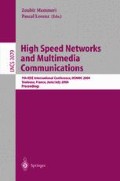Abstract
This paper contains an evaluation of the RSVP Reservation Aggregation architecture, proposed by the IETF as a scalable alternative to the standard RSVP/IntServ for usage in high-speed core networks. We point out its main strengths, weaknesses and limitations, and describe our implementation of the architecture in the ns-2 simulator, including the definition of policies which are considered out of the scope of RFC3175, of which the most important is the aggregate bandwidth management policy.
The simulation results confirm that the architecture is able to meet the QoS requirements of a controlled load service class with much lighter classification, forwarding and signalling procedures than RSVP/IntServ. They also demonstrate that the scalability comes at the price of a lower utilization of network resources. We further provide some guidelines for setting the tunable parameters, bulk size and hysteresis time, based on the analysis of the simulation results.
Access this chapter
Tax calculation will be finalised at checkout
Purchases are for personal use only
Preview
Unable to display preview. Download preview PDF.
References
Braden, R., Clarck, D., Shenker, S.: Integrated Services in the Internet Architecture: an Overview. RFC 1633, Internet Engineering Task Force (1994)
Braden, R., Zhang, L., Berson, S., Herzog, S., Jamin, S.: Resource Reservation Protocol (RSVP) - Version 1 Functional Specification. RFC 2205, Internet Engineering Task Force (1997)
Blake, S., Blake, D., Carlson, M., Davies, E., Wang, Z., Weiss, W.: An Architecture for Differentiated Services. RFC 2475, Internet Engineering Task Force (1998)
Baker, F., Iturralde, C., Faucheur, F.L., Davie, B.: Aggregation of RSVP for IPv4 and IPv6 Reservations. RFC 3175, Internet Engineering Task Force (2001)
Schmitt, J., Karsten, M., Wolf, L., Steinmetz, R.: Aggregation of Guaranteed Service Flows. In: Seventh International Workshop on Quality of Service, pp. 147–155 (1999)
Arizona State University: MPEG-4 and H.263 Video Traces for Network Performance Evaluation (2004), http://trace.eas.asu.edu/TRACE/trace.html
Author information
Authors and Affiliations
Editor information
Editors and Affiliations
Rights and permissions
Copyright information
© 2004 Springer-Verlag Berlin Heidelberg
About this paper
Cite this paper
Prior, R., Sargento, S., Brandão, P., Crisóstomo, S. (2004). Performance Evaluation of the RSVP Reservation Aggregation Model. In: Mammeri, Z., Lorenz, P. (eds) High Speed Networks and Multimedia Communications. HSNMC 2004. Lecture Notes in Computer Science, vol 3079. Springer, Berlin, Heidelberg. https://doi.org/10.1007/978-3-540-25969-5_15
Download citation
DOI: https://doi.org/10.1007/978-3-540-25969-5_15
Publisher Name: Springer, Berlin, Heidelberg
Print ISBN: 978-3-540-22262-0
Online ISBN: 978-3-540-25969-5
eBook Packages: Springer Book Archive

